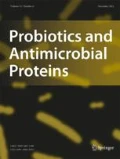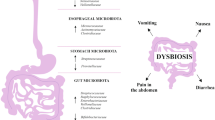Abstract
Functional constipation has a high prevalence in both adults and children affecting quality of life. Evidence suggests that probiotics can reduce the symptoms of constipation. As the effects of probiotics are strain specific, the efficacy of Bacillus coagulans Unique IS2 in the treatment of functional constipation in adults was evaluated. Subjects (n = 100) diagnosed with functional constipation were supplemented with either B. coagulans Unique IS2 (2 billion CFU) or placebo capsules once daily for 4 weeks. Subjects were evaluated for treatment success (defined as three or more spontaneous stools per week), stool consistency, difficulty of defecation, defecation and abdominal pain. By the end of the fourth week, there was a statistically significant (p < 0.001) increase in number of bowel movements in the probiotic treated group as compared to placebo. Ninety eight percent of subjects in the probiotic group achieved normal stool consistency as compared to placebo (74%). Moreover, there was relief from symptoms of incomplete evacuation, painful defecation and abdominal pain associated with constipation in probiotic treated group as compared to placebo. In conclusion, B. coagulans Unique IS2 significantly decreased the symptoms of constipation indicating effectiveness of the strain in the treatment of constipation.
Trial registration: CTRI/2017/11/010539.




Similar content being viewed by others
References
Suares NC, Ford AC (2011) Prevalence of, and risk factors for, chronic idiopathic constipation in the community: systematic review and meta-analysis. Am J Gastroenterol 106(9):1582–1591. https://doi.org/10.1038/ajg.2011.164
Dimidi E, Christodoulides S, Fragkos KC, Scott SM, Whelan K (2014) The effect of probiotics on functional constipation in adults: a systematic review and meta-analysis of randomized controlled trials. Am J Clin Nutr 100(4):1075–1084. https://doi.org/10.3945/ajcn.114.089151
Wald A, Scarpignato C, Kamm MA, Mueller-Lissner S, Helfrich I, Schuijt C, Bubeck J, Limoni C, Petrini O (2007) The burden of constipation on quality of life: results of a multinational survey. Aliment Pharmacol Ther 26:227–236. https://doi.org/10.1111/j.1365-2036.2007.03376.x
Dennison C, Prasad M, Lloyd A, Bhattacharyya SK, Dhawan R, Coyne K (2005) The health-related quality of life and economic burden of constipation. Pharmacoeconomics 23(5):461–476. https://doi.org/10.2165/00019053-200523050-00006
Lindberg G, Hamid SS, Malfertheiner P, Thomsen OO, Fernandez LB, Garisch J, Thomson A, Goh KL, Tandon R, Fedail S, Wong BC, Khan AG, Krabshuis JH, LeMair A (2011) World gastroenterology organisation global guideline: constipation—a global perspective. J Clin Gastroenterol 45(6):483–487. https://doi.org/10.1097/MCG.0b013e31820fb914
American college of gastroenterology chronic constipation task force (2005) An evidence-based approach to the management of chronic constipation in North America. Am J Gastroenterol 100(S1):S1–S4. https://doi.org/10.1111/j.1572-0241.2005.50613_1.x
Basilisco G, Coletta M (2013) Chronic constipation: a critical review. Dig Liver Dis 45(11):886–893. https://doi.org/10.1016/j.dld.2013.03.016
Johansen JF, Kralstein J (2007) Chronic constipation: a survey of the patient perspective. Aliment Pharmacol Ther 25(5):599–608. https://doi.org/10.1111/j.1365-2036.2006.03238.x
Hill C, Guarner F, Reid G, Gibson GR, Merenstein DJ, Pot B, Morelli L, Canani RB, Flint HJ, Salminen S, Calder PC, Sanders MA (2014) The International Scientific Association for Probiotics and Prebiotics consensus statement on the scope and appropriate use of the term probiotic. Nat Rev Gastroenterol Hepatol 11:506–514. https://doi.org/10.1038/nrgastro.2014.66
Lollo PC, Morato PN, Moura CS, Almada CN, Felicio TL, Esmerino EA, Barros ME, Amaya FJ, Sant'Ana AS, Raices RR, Silva MCC, Cruz AG (2015) Hypertension parameters are attenuated by the continuous consumption of probiotic Minas cheese. Food Res Int 76(3):611–617. https://doi.org/10.1016/j.foodres.2015.07.015
Moura CS, Lollo PC, Morato PN, Esmerino EA, Margalho LP, Santos-Junior VA, Coimbra PT, Cappato LP, Silva MC, Garcia-Gomes AS, Granato D, Bolini HMA, Sant’Ana AS, Cruz AG, Amaya-Farfan J (2016) Assessment of antioxidant activity, lipid profile, general biochemical and immune system responses of Wistar rats fed with dairy dessert containing Lactobacillus acidophilus La-5. Food Res Int 90:275–280. https://doi.org/10.1016/j.foodres.2016.10.042
Mostafai R, Nachvakc SM, Mohammadi R, Rocha RS, da Silva MC, Esmerino EA, Nascimento KO, Cruz AG, Mortazavian AM (2019) Effects of vitamin D-fortified yogurt in comparison to oral vitamin D supplement on hyperlipidemia in pre-diabetic patients: a randomized clinical trial. J Funct Foods 52:116–120. https://doi.org/10.1016/j.jff.2018.10.040
Sperry MF, Silva HL, Balthazar CF, Esmerino EA, Verruck S, Prudencio ES, Neto RP, Tavares MI, Peixoto JC, Nazzaro F, Rocha RS, Moraes J, Gomes ASG, Raices RSL, Silva MC, Granato D, Pimentel TC, Freitas MQ, Cruz AG (2018) Probiotic Minas Frescal cheese added with L. casei 01: physicochemical and bioactivity characterization and effects on hematological/biochemical parameters of hypertensive overweighted women–a randomized double-blind pilot trial. J Funct Foods 45:435–443. https://doi.org/10.1016/j.jff.2018.04.015
Martins AA, Santos-Junior VA, Filho ERT, Silva HLA, Ferreira MVS, Graça JS, Esmerino EA, Lollo PCB, Freitas MQ, Sant'Ana AS, Costa LEO, Raices RSL, Silva MC, Cruz AG, Barros ME (2018) Probiotic Prato cheese consumption attenuates development of renal calculi in animal model of urolithiasis. J Funct Foods 49:378–383. https://doi.org/10.1016/j.jff.2018.08.041
Ibarra A, Latreille-Barbier M, Donazzolo Y, Pelletier X, Ouwehand AC (2018) Effects of 28-day Bifidobacterium animalis subsp. lactis HN019 supplementation on colonic transit time and gastrointestinal symptoms in adults with functional constipation: a double-blind, randomized, placebo-controlled, and dose-ranging trial. Gut Microbes 9(3):236–251. https://doi.org/10.1080/19490976.2017.1412908
Kim SE, Choi SC, Park KS, Park MI, Shin JE, Lee TH, Jung KW, Koo HS, Myung SJ (2015) Change of fecal flora and effectiveness of the short-term VSL# 3 probiotic treatment in patients with functional constipation. J Neurogastroenterol Motil 21(1):111–120. https://doi.org/10.5056/jnm14048
Martínez-Martínez MI, Calabuig-Tolsa R, Cauli O (2017) The effect of probiotics as a treatment for constipation in elderly people: a systematic review. Arch Gerontol Geriatr 71:142–149. https://doi.org/10.1016/j.archger.2017.04.004
Miller LE, Zimmermann AK, Ouwehand AC (2016) Contemporary meta-analysis of short-term probiotic consumption on gastrointestinal transit. World J Gastroenterol 22(21):5122–5131. https://doi.org/10.3748/wjg.v22.i21.5122
Khalif IL, Quigley EMM, Konovitch EA, Maximova ID (2005) Alterations in the colonic flora and intestinal permeability and evidence of immune activation in chronic constipation. Dig Liver Dis 37(11):838–849. https://doi.org/10.1016/j.dld.2005.06.008
Zoppi G, Cinquetti M, Luciano A, Benini A, Muner A, Bertazzoni-Minelli E (1998) The intestinal ecosystem in chronic functional constipation. Acta Paediatr 87(8):836–841. https://doi.org/10.1111/j.1651-2227.1998.tb01547.x
Choi CH, Chang SK (2015) Alteration of gut microbiota and efficacy of probiotics in functional constipation. J Neurogastroenterol Motil 21(1):4–7. https://doi.org/10.5056/jnm14142
Champagne CP, Cruz AG, Daga M (2018) Strategies to improve the functionality of probiotics in supplements and foods. Curr Opin Food Sci 22:160–166. https://doi.org/10.1016/j.cofs.2018.04.008
Elshaghabee FMF, Rokana N, Gulhane RD, Sharma C, Panwar H (2017) Bacillus as potential probiotics: status, concerns, and future perspectives. Front Microbiol 8:1490. https://doi.org/10.3389/fmicb.2017.01490
Ahire JJ, Patil KP, Chaudhari BL, Chincholkar SB (2011) Bacillus spp. of human origin: a potential siderophoregenic probiotic bacteria. Appl Biochem Biotechnol 164(3):386–400. https://doi.org/10.1007/s12010-010-9142-6
Sudha RM, Bhonagiri S (2012) Efficacy of Bacillus coagulans strain unique IS-2 in the treatment of patients with acute diarrhea. Int J Probiotics Prebiotics 7(1):33–37
Sudha RM, Yelikar KA, Deshpande S (2012) Clinical study of Bacillus coagulans unique IS-2 (ATCC PTA-11748) in the treatment of patients with bacterial vaginosis. Indian J Microbiol 52(3):396–399. https://doi.org/10.1007/s12088-011-0233-z
Sudha MR, Jayanthi N, Aasin M, Dhanashri RD, Anirudh T (2018) Efficacy of Bacillus coagulans unique IS2 in treatment of irritable bowel syndrome in children: a double blind, randomised placebo controlled study. Benefic Microbes 9(4):563–572. https://doi.org/10.3920/BM2017.0129
Govender M, Choonara YE, Kumar P, du Toit LC, van Vuuren S, Pillay V (2014) A review of the advancements in probiotic delivery: conventional vs. non-conventional formulations for intestinal flora supplementation. AAPS PharmSciTech 15(1):29–43. https://doi.org/10.1208/s12249-013-0027-1
Ara K, Meguro S, Hase T, Tokimitsu I, Otsuji K, Kawai S, Ito S, Iino H (2002) Effect of spore-bearing lactic acid-forming bacteria (Bacillus coagulans SANK 70258) administration on the intestinal environment, defecation frequency, fecal characteristics and dermal characteristics in humans and rats. Microb Ecol Health Dis 14(1):4–13. https://doi.org/10.1080/089106002760002694
Minamida K, Nishimura M, Miwa K, Nishihira J (2015) Effects of dietary fiber with Bacillus coagulans lilac-01 on bowel movement and fecal properties of healthy volunteers with a tendency for constipation. Biosci Biotechnol Biochem 79(2):300–306. https://doi.org/10.1080/09168451.2014.972331
Ohkusa T, Koido S, Nishikawa Y, Sato N (2019) Gut microbiota and chronic constipation: a review and update. Front Med 6:19. https://doi.org/10.3389/fmed.2019.00019
Koebnick C, Wagner I, Leitzmann P, Stern U, Zunft HJ (2003) Probiotic beverage containing Lactobacillus casei Shirota improves gastrointestinal symptoms in patients with chronic constipation. Can J Gastroenterol 17(11):655–659. https://doi.org/10.1155/2003/654907
Ishizuka A, Tomizuka K, Aoki R, Nishijima T, Saito Y, Inoue R, Ushida K, Mawatari T, Ikeda T (2012) Effects of administration of Bifidobacterium animalis subsp. lactis GCL2505 on defecation frequency and bifidobacterial microbiota composition in humans. J Biosci Bioeng 113(5):587–591. https://doi.org/10.1016/j.jbiosc.2011.12.016
Yoon JY, Cha JM, Oh JK, Tan PL, Kim SH, Kwak MS, Jeon JW, Shin HP (2018) Probiotics ameliorate stool consistency in patients with chronic constipation: a randomized, double-blind, placebo-controlled study. Dig Dis Sci 63(10):2754–2764. https://doi.org/10.1007/s10620-018-5139-8
Tabbers MM, Chmielewska A, Roseboom MG, Crastes N, Perrin C, Reitsma JB, Szajewska H (2011) Benninga MA (2011) fermented milk containing Bifidobacterium lactis DN-173 010 in childhood constipation: a randomized, double-blind, controlled trial. Pediatrics 127(6):e1392–e1399. https://doi.org/10.1542/peds.2010-2590
Wojtyniak K, Horvath A, Dziechciarz P, Szajewska H (2017) Lactobacillus casei rhamnosus Lcr35 in the management of functional constipation in children: a randomized trial. J Pediatr 184:101–105. https://doi.org/10.1016/j.jpeds.2017.01.068
McFarland LV, Evans CT, Goldstein EJC (2018) Strain-specificity and disease-specificity of probiotic efficacy: a systematic review and meta-analysis. Front Med 5:124. https://doi.org/10.3389/fmed.2018.00124
Saarela MH (2018) Safety aspects of next generation probiotics. Curr Opin Food Sci 30:8–13. https://doi.org/10.1016/j.cofs.2018.09.001
Ratna Sudha M, Chauhan P, Dixit K, Babu S, Jamil K (2010) Molecular typing and probiotic attributes of a new strain of Bacillus coagulans–unique IS2: a potential biotherapeutic agent. Genet Eng Biotechnol J 7:1–20
Upadrasta A, Pitta S, Madempudi RS (2016) Draft genome sequence of the spore-forming probiotic strain Bacillus coagulans unique IS2. Genome Announc 4(2):e00225–e00216. https://doi.org/10.1128/genomeA.00225-16
Sudha RM, Sunita M, Sekhar BM (2016) Safety studies of Bacillus coagulans unique IS2 in rats: morphological, biochemical and clinical evaluations. Int J Probiotics Prebiotics 11:43
Author information
Authors and Affiliations
Corresponding author
Ethics declarations
This study was conducted in compliance with the code of conduct for research involving human volunteers as issued by the International Conference on Harmonisation–Good Clinical Practice (ICH-GCP), Indian Council of Medical Research guidelines (ICMR; ethical guidelines for biomedical research on human subjects) and the principles of the Declaration of Helsinki. Informed consent forms were approved by the ethical committees of study sites and the trial was registered prospectively with the clinical trial registry of India (CTRI/2017/11/010539). The study was initiated after obtaining informed consent.
Competing Interests
R.S.M., J.N. and J.J.A. are employed by Unique Biotech Ltd. which is a manufacturer of probiotics. They wish to state that the study was conducted independently with no intervention on their part during the duration of the study.
Additional information
Publisher’s Note
Springer Nature remains neutral with regard to jurisdictional claims in published maps and institutional affiliations.
Electronic supplementary material
ESM 1
(DOCX 26 kb)
Rights and permissions
About this article
Cite this article
Madempudi, R.S., Neelamraju, J., Ahire, J.J. et al. Bacillus coagulans Unique IS2 in Constipation: A Double-Blind, Placebo-Controlled Study. Probiotics & Antimicro. Prot. 12, 335–342 (2020). https://doi.org/10.1007/s12602-019-09542-9
Published:
Issue Date:
DOI: https://doi.org/10.1007/s12602-019-09542-9




